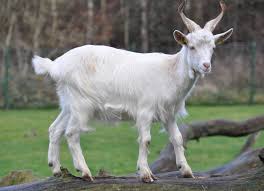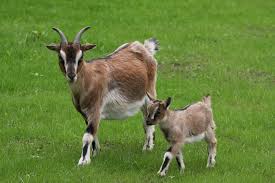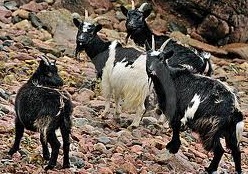The Pygmy goat is a breed of miniature domestic goat. The pygmy goat can be used for many different things
and that is why a pygmy goat is strictly classified as a multi purpose animal as stated on NPGA or national
pygmy goat association. The pygmy goat is quite hardy, an asset in a wide variety of settings, and can adapt
to virtually all climates. Castrated males are called wethers and can be shown in pet classes. There are
also pedigree classes at shows for entire goats. There are separate pedigree lineages in Europe and Africa
(where they are sometimes called the African Pygmy) the United States. And this is because there were only
a few hundred pygmy goats imported from Africa around 60 years ago.
Description
Females, called does, weigh 24 to 34 kg (53 to 75 lb) and males, called bucks, weigh 27 to 39 kg
(60 to 86 lb). Wither height ranges from 41 to 58 cm (16 to 23 in). The color and pattern of their coats
vary significantly, and can be categorized into caramel patterned, agouti patterned, and black patterned.
Within these categories, there are caramel with black markings, caramel with brown markings, brown agouti,
grey agouti, black agouti, black with white markings, and solid black.
Reproduction
Pygmy goats are precocial and polyestrous breeders; bearing one to four young every nine to 12 months after a
five-month gestation period. Does are usually bred for the first time at about twelve to 18 months, although
they may conceive as early as two months if care is not taken to separate them early from male kids. Newborn
kids will nurse almost immediately, begin eating grain and roughage within a week, and are weaned by ten
weeks of age.
Polyestrous sexual behavior means that they experience heat and can be freshened (made to come into milk
production) year-round. If milking is a priority, a continuous supply of milk can be obtained by breeding
two or more pygmy does alternately. Some full-size dairy breeds are also noted for polyestrous sexual
behavior.







